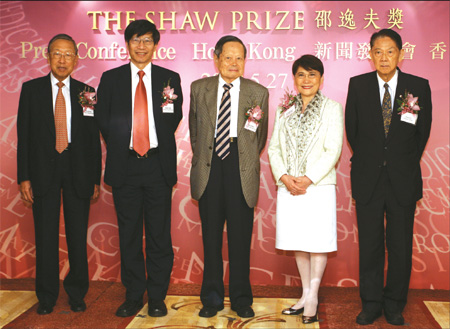US scientists sweep Shaw Prizes
Updated: 2010-05-28 07:36
By Timothy Chui(HK Edition)
|
|||||||||
|
Professor Yang Chen-ning (center), chair of the board of Adjudicators of The Shaw Prize, Mona Shaw (2nd right), chairperson of The Shaw Prize Foundation, and three professors on the board of adjudicators meet the media at the press conference of The Shaw Prize Foundation Thursday. The Shaw Laureates for 2010 were announced at the conference. EDMOND TANG / CHINA DAILY |
Five American professors have swept this year's Shaw Prizes for their work in astronomy, life sciences and mathematics.
Johns Hopkins University professor of physics and astronomy Charles Bennett shares the Shaw Prize in Astronomy with professor Layman Page and professor David Spergel both of Princeton University for their work with the Wilkinson Microwave Anisotropy Probe (WMAP), a gold and white spacecraft launched in 2001 that measures temperature differences in the universe's background radiation.
Analyzing the extraordinary detailed, high resolution map of cosmic microwave background radiation, the team was able to measure the geometry, age and make-up of the universe to an unprecedented level of resolution.
"If you go back 15 years when I was a student, people said it would have been 10 to 20 billion years. About ten years ago people would say 14 billion years, a few years ago, people would say 13.7 billion years. Now they say 13.75 billion years," vice-chairman of the board of adjudicators and pro-vice-chancellor of the Chinese University of Hong Kong, Kenneth Young, said at the prize's announcement Thursday.
"That's the level of precision we're talking about on the subject of cosmology, which was not too long ago a matter of speculation, almost abstract philosophy. Now it has become precise science through the work of people like the group responsible for WMAP," he said, adding that their findings would help our understanding of the origins of the universe.

The principal investigator of the ongoing WMAP mission, Bennett was a former member of the team that first detected variations in afterglow radiation from the Big Bang and was twice awarded for his work in the field with the NASA Exceptional Scientific Achievement Medal.
One of the most cited scientists working in the field of space science, he shares the US$1 million prize with Page and Spergel, who are developing new techniques to enable direct imaging for planets similar to earth, in other solar systems.
"A complete shock. It was the farthest thing from my mind. I received the news while in the hospital with my son who is recovering from a broken leg.The main thing to keep in mind is that the three of us are part of an extraordinarily strong team that made WMAP possible. The award represents the dedication and insights of many. I haven't thought much about what to do with the money. My first inclination is to use it to further science," professor Layman Page said upon hearing the news.
The sole recipient of the 2010 Shaw Prize in Life Science and Medicine, professor David Julius, chairman of the department of physiology at the University of California, San Francisco, was awarded for his discovery of how molecules in nerves sense pain and temperature.
His pioneering work over the last decade and a half has weighty implications for the treatment of chronic pain, drug design and the development of new and innovative pain relieving agents.
The third and final of the Shaw Prizes, the Mathematical Sciences Prize, was awarded to Princeton's Institute for Advanced Study's professor Jean Bourgain for his contributions to mathematics in resolving central and long-standing problems in probability theory, statistical physics, dynamical systems and number theory.
Established in 2004 and named after famed Hong Kong media mogul Sir Run Run Shaw, the Shaw Prize is awarded, "regardless of race, nationality and religious belief, to those who have achieved significant breakthrough in academic and scientific research or application and whose work has resulted in a positive and profound impact on mankind." The award is administered by the Shaw Prize Foundation based in Hong Kong.
"The Shaw prize in the past seven years has obtained a very prestigious position," Tsinghua University professor and chairman of the board of adjudicators Yang Chen-ning said.
"In Astronomy, the Shaw prize is the number one prize valued internationally. In biology and medicine, the Shaw prize is considered the number two ranked, only after the Nobel prize," he said of his general impression gathered from eminent scientists in the respective fields.
China Daily
(HK Edition 05/28/2010 page1)
